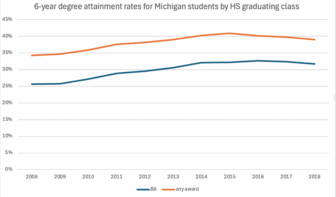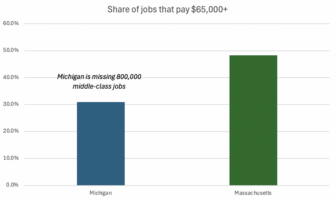Theme: Quality education matters most
Michigan––any many other states––have been slashing higher education funding for the last decade. It has been viewed as something we can’t afford in hard economic times. A luxury that you invest in when times are good, rather than an essential ingredient to making the economy grow again. Not smart!
As I wrote in a previous post:
“Two quotes from the press coverage … lay out clearly the differences on the role higher eduction plays in economic development. Senate Finance Committee chair Jack Brandenburg said as reported by MLive: “I don’t think the state can afford the $9,600 (in tuition support) along with the personal property tax cut to manufacturers and small manufacturers,” he said after the session. “I think we really have to concentrate on getting the economy back on track.”
Contrast that to Patrick Doyle, Domino’s Pizza CEO in Crain’s Detroit Business: Doyle said that although unemployment is high in Michigan, talent is lacking, and that ultimately hurts jobs coming into the state. The conference will discuss how access to talent is a key factor in where companies base their operations. “The days of people simply chasing lower wages are really behind us, and companies need to know they can access the talent they need,” he said. “Growing that pool is critical to the long-term economic success of the state.”
Both understand higher education is important. But one sees it as a driver of economic growth, something you invest in to stimulate economic growth; the other as a luxury, something you invest in after the economy is growing. To us the evidence is clear: Mr. Doyle is right. Higher education is a driver of economic growth and must be a state economic development funding priority.”
Two recent articles make that case well. The first from the New York Times entitled “Next Made-in-China Boom: College Graduates” The Times writes:
China is making a $250 billion-a-year investment in what economists call human capital. Just as the United States helped build a white-collar middle class in the late 1940s and early 1950s by using the G.I. Bill to help educate millions of World War II veterans, the Chinese government is using large subsidies to educate tens of millions of young people as they move from farms to cities. The aim is to change the current system, in which a tiny, highly educated elite oversees vast armies of semi-trained factory workers and rural laborers. China wants to move up the development curve by fostering a much more broadly educated public, one that more closely resembles the multifaceted labor forces of the United States and Europe.
Chinese policy makers clearly understand what Michigan policy makers don’t: investing in quality higher education is an economic growth imperative.
In a terrific Detroit News column entitled “State fails higher education test”, Daniel Howes strongly makes that case. He writes: “The implications are clear. As much as a restructured Detroit auto industry and a more business-friendly climate help, an under-educated workforce ill-prepared for the jobs of the present and future undermines the state’s economic recovery and threatens longer term growth prospects. … By now it should be clear to all but the deliberately deluded that Old Economy Michigan is quickly receding, that rising incomes and better job opportunities require more than a high school diploma, that smart higher education is as much about learning how to think and adapt as it is learning a set of skills.”
Howes makes two essential points that Lansing policy makers from both parties don’t get: (1) investing in higher education is essential to growing the states economy and (2) that the value in higher education comes most not from narrow job related skills––although they are important––but rather from broad skills that about “learning how to think and adapt “.
Howes concludes, based largely on the leadership on the issue of Business Leaders for Michigan: “Business understands that. Now the politicians need to demonstrate that they do, too.” Exactly!






